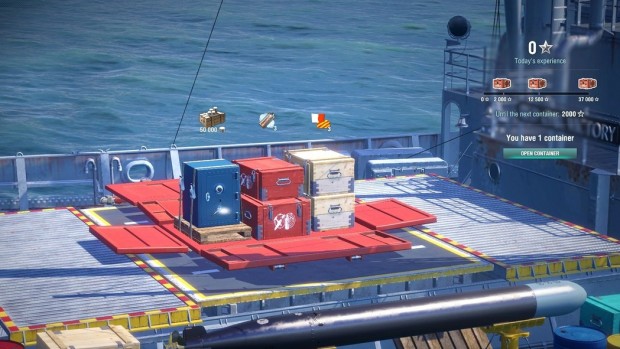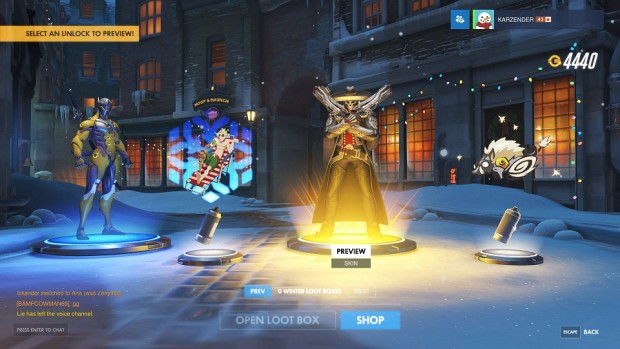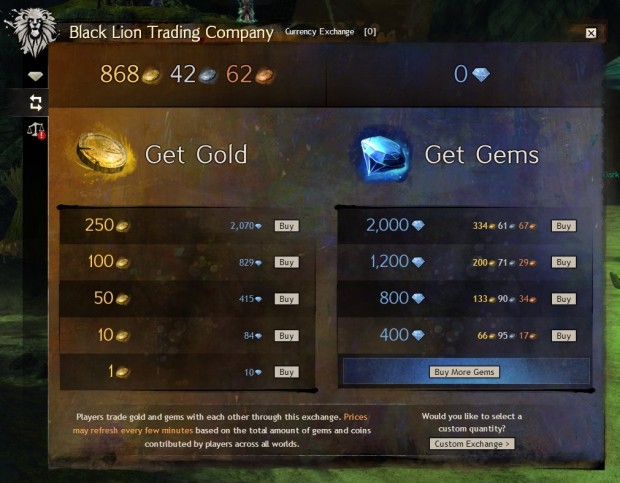Loot Boxes Might Not Technically Be Gambling, But They're Definitely Something
It's the “Season of the Loot Box,” and everyone's got their two cents to put in – which would buy you about 1% of a typical box in most games.
By now you've probably seen the various thinkpieces that are popping up all over the internet in the wake of games like Middle-earth: Shadow of War and Star Wars Battlefront 2 – full-priced PC and console games that also offer aggressive loot box monetization. Their presence is also being re-examined in older, full-priced titles like Overwatch.
Those of us who have been following free-to-play games for a long time are bemused by the sudden attention loot boxes are getting. Me, I've been trying to stay on the sidelines, reading many of those other articles and trying not to jump in with a knee-jerk response. Mostly, I didn't think I had anything to offer to the conversation beyond the usual “gambleboxes suck” mentality. But a recent conversation and TV program made me rethink exactly what they are and what their future could be.
Technicalities, technicalities
Loot boxes are all the rage these days – emphasis on rage. Lots of people hate them. Some people don't mind them, adopting the “If you can afford it, go ahead and buy them,” mentality, which I can respect. Those people at least seem to be indifferent to loot boxes' continuation. If they vanished from all games tomorrow, they'd be OK with that (and the first group of people would rejoice).
The only people who actually like them and would be upset at their sudden departure, it would seem, are the people who work in the industry and stand to profit from them. Recently, I engaged with a friend on Twitter who works in gaming PR, who vociferously stated that loot boxes are not gambling. His reasoning? “You win every time.”
Obviously, the definition of “win” is something gamers have never agreed upon. And I think my PR friend's reasoning is a little flawed. Yes, you get stuff from a loot box all the time. It might not be the rare stuff you really want, but it's something, akin to getting common cards from a pack of Magic: The Gathering or baseball cards. That's different from, say, a lottery, where most of the time you'll get nothing back for your money.
Counterpoint: What if the lottery did offer something of extremely low value for losing tickets – say, a breath mint? Then you “win every time.” Does that mean the lottery is no longer gambling?
Legally, I think that a big deal with digital games and their loot boxes is that the items you get have no intrinsic value. In fact, it's generally against the terms of service of any game to sell those items for cash – not to mention being very difficult or even impossible, short of selling off your entire account. For instance, you can't trade Hearthstone cards or Overwatch skins, not for other items or money. The same doesn't apply to baseball cards or breath mints.
So my PR friend might be correct: Loot boxes in video games might not be gambling, not from a technical standpoint. At the very least, it's a murky legal question. If a minor blows hundreds of dollars buying Cartel Crates in Star Wars: The Old Republic, BioWare is probably not under any legal obligation to do anything about it, just as Wizards of the Coast doesn't have to reimburse someone who doesn't get what they want from opening a hundred Magic packs.
But laws can change, to regulate or make illegal a new (or mostly new) practice, such as loot boxes in games. In fact, that's how laws work and why they exist.
From MMA to MMO
Last week, I came across a documentary about the first mixed martial arts competitions in the United States, which took place in the late '70s and early '80s. Boxing was regulated by the state athletic commission, but this wasn't boxing. As the organizer of the first MMA tournament put it, the boxing commissioner turned up at their event, but just to observe; he didn't have any jurisdiction over it. The documentary covered the various changes in legality that MMA went through in the U.S. during those early years, and now it's a legitimate sport with all the proper regulations in place to ensure the safety of its competitors.
To use an analogy, loot boxes are to gambling what MMA is to boxing. They're similar in many ways, but not exactly the same. But just like MMA, which was totally unregulated in its infancy and is now regulated or even illegal in most of the world, things can change.
That might be the future of loot boxes. I don't think they'll ever be made totally illegal, but just like gambling and MMA, they'll probably wind up having some kind of regulations attached to them. They won't be exactly the same as what casinos or lotteries have to deal with, but those will probably be the basis for them, just as boxing regulations likely served as the basis for MMA regulations.
Whether game developers will come together to adopt those regulations or have them imposed upon them by the government remains to be seen. And game developers will naturally try to circumvent any restrictions placed upon them, similar to how Blizzard dodged China's gambling laws by offering Hearthstone packs for “free” with another purchase. For games – mostly MMORPGs – that drop loot boxes in the game but sell keys on their marketplace, that could be another workaround. See, they're not selling the boxes on their cash shop, but the right to open those boxes! Or if a game uses a cash shop currency, like Guild Wars 2's gems or World of Tanks' gold, then you're spending money to get that and not directly on boxes or keys.
All in all, loot boxes might not be gambling, in the fullest sense, but they're close enough to warrant some of the same scrutiny. They're in the limelight right now, and it's only a matter of time before the situation makes its way into the hands of a person or people powerful enough to do something about it. It's a messy situation that's likely to get worse before it gets better – and then, depending on how well the authority in charge of crafting the regulations understands the system, could get worse again.
Related Articles
About the Author

Jason Winter is a veteran gaming journalist, he brings a wide range of experience to MMOBomb, including two years with Beckett Media where he served as the editor of the leading gaming magazine Massive Online Gamer. He has also written professionally for several gaming websites.
More Stories by Jason WinterRead Next

Five years ago, when I was trying to get a friend to try Guild Wars 2, he commented that it looked OK, but he was "tired of fantasy MMOs." It's an understandable concern.
You May Enjoy

And the bike has only gotten cooler.

The update also introduces fashion templates, a quickplay mode for raids, and more.

The new episode introduces a newly-awakened Descendant with secrets to uncover.

Reign of Talon will tell the whole story in six seasons.



Either the industry will regulate itself like with ESRB, or governments will be forced to step in and regulate it for them.